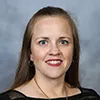I chose to attend Campbell University as a pre-pharmacy major in 1992. I realized I excelled in laboratory classes and felt I would be more impactful if I made drugs vs. selling drugs. I was accepted into the Charter Class of the Pharmaceutical Sciences Program in the School of Pharmacy at Campbell University. My classes were taught by a mix of Pharmacy Faculty Professors and Pharmaceutical/Biotech professionals. For example, Wyeth lead my Validation Course, GSK had a part in my Industrial Pharmacy Class, and I spent a month at Wyeth designing facilities. In 1995, the Carolina South Atlantic (CaSA) Chapter of ISPE started 2 student chapters, championed by Jane Brown, – one at North Carolina State University and one at Campbell University (CU). I was the Vice President of the Campbell University ISPE Student Chapter for the 2 years I was in the pharmaceutical sciences program. Jane Brown, Bo Crouse-Feuerhelm, Dr. John Mennear (founder of the Pharmaceutical Sciences Program), Dr. Emanuel Diliberto (Chair of Pharmaceutical Sciences Program) and many others in the CaSA Chapter and at Campbell University instilled in me the importance of always networking, always learning, always improving oneself.
The Campbell University faculty sought out internships for those in the Pharmaceutical Sciences Program and I got an internship at the Environmental Protection Agency (EPA) in Dr. Linda Birnbaum’s lab. I became a federal employee the day after I graduated Campbell University in May 1997 working under Dr. Linda Birnbaum. From there, I worked on the Genome project (1997-1998) between the EPA and a National Institute of Health (NIH) focusing on the markers for the developing brain. During this time, I also took one class each semester at the University of North Carolina Chapel Hill (UNC-CH) School of Medicine to evaluate pursuing a PhD in Toxicology. I was passionate about toxicology and human health and decided the mechanistic toxicology program at North Carolina Chapel Hill was the best fit for me. I transitioned from a federal laboratory technician to a PhD student at North Carolina Chapel Hill conducting my PhD research at EPA in Dr. Stephanie Padilla’s lab. I had to meet both the North Carolina Chapel Hill Toxicology requirements for a PhD and a law-making agencies mission and directives. A lot of PhD students wanted jobs in the pharmaceutical/biotech arena, and I helped found with the support of Jane Brown and others in CaSA the first ISPE Student Chapter at North Carolina Chapel Hill; recruiting my fellow toxicology classmates to serve as officers.
In 2000, ISPE held the first ever student poster competition for both undergraduate and graduate students with a fellow North Carolina Chapel Hill Toxicology PhD student winning the International ISPE Poster Competition. In 2001, I competed as a graduate student and was the first International ISPE Graduate Student Poster Winner. 2001 ISPE Annual Meeting & Expo was my first Annual ISPE meeting and Jane Brown ensured that I met and interacted with people she knew and helped me expand my network. To further my understanding of human health, I won a Lineberger Comprehensive Cancer Center (LCCC) Fellowship conducting pathology research in Dr Bernard Weismann’s lab. I switched from rodent models; behavior analysis; analytical method development; enzyme kinetics; metabolic studies I had conducted for my PhD research to aseptic cell-culture techniques; gene expression analysis using transfection of cell lines, small interfering RNA (siRNA); Western blot analysis and RT-PCR in a rare pediatric cancer. Did I mention that my son was born 2 months early, weighed 3 pounds, delayed my PhD defense; was interviewing for jobs; secured my Lineberger Comprehensive Cancer Center Fellowship; and successfully defended my PhD all in 2004? With no extended family in the State of North Carolina, I could not have done any of this without the love and support of my husband, Maverick. Being the mother of a preemie, I was passionate about pediatrics and my son, Landon was the reason I pursued a pathology fellowship focusing on a rare pediatric cancer.
As a Lineberger Comprehensive Cancer Center Fellow, I remained involved with ISPE CaSA and became the Student Affairs Chair. I have worked in the environmental sector, taught nursing students Anatomy & Physiology (entire lab and lecture courses), am an adjunct assistant professor at Campbell University’s College of Pharmacy and Health Sciences, was a study director overseeing in vivo and in vitro trials, consulting research toxicologist for the National Toxicology Program (NTP), overseen formulations, led validation and project manager for CSV site deployments, and a consulting board certified toxicologist (DABT) who has evaluated more than 200 products, provide extractable and leachable evaluations, and conduct safety training. Dr. John Mennear and my parents told me to “put back into the system from which you have taken.” We all have had mentors’, and no one succeeds on their own. Having served as President of the ISPE CaSA Chapter and Chair of the International Young Professional group brought me great joy. I am happy to have coffee with a student, young professional or peer regarding our amazing industry. I am and always have been passionate about human health and being a member of ISPE since 1996 had greatly enriched my life. The ISPE CaSA Chapter and ISPE in general makes me feel that I am among family. I have built life-long relationships with people in our industry and friends that I can turn to for anything – personal or professional. Cell and gene therapies are challenging how our industry manufacturers and delivers safe, efficacious, quality products to patients and I am excited to see what our industry in partnership with ISPE will accomplish in the next 10-20 years.





